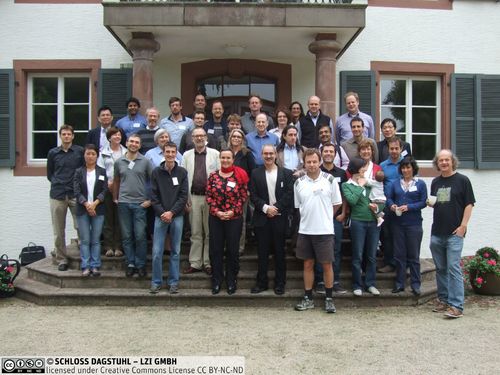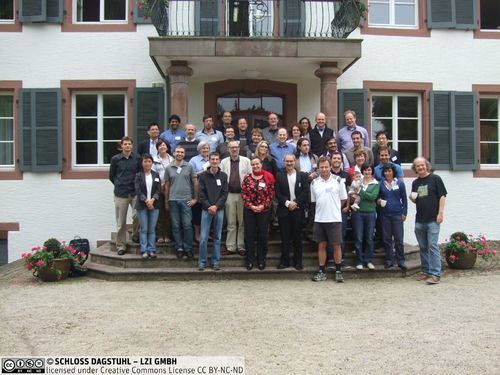Dagstuhl Seminar 12362
The Multilingual Semantic Web
( Sep 02 – Sep 07, 2012 )
Permalink
Organizers
- Paul Buitelaar (National University of Ireland - Galway, IE)
- Key-Sun Choi (KAIST - Daejeon, KR)
- Philipp Cimiano (Universität Bielefeld, DE)
- Eduard H. Hovy (USC - Marina del Rey, US)
Contact
- Andreas Dolzmann (for scientific matters)
- Annette Beyer (for administrative matters)
Schedule
The amount of Internet users speaking native languages other than English has seen a substantial growth in recent years. Statistics from 2010 in fact show that the number of non-English Internet users is almost three times the number of English-speaking users (1430 million vs. 536 million users). As a consequence, the Web is turning more and more into a truly multilingual platform in which speakers and organizations from different languages and cultural backgrounds collaborate, consuming and producing information at a scale without precedent. Originally conceived by Tim Berners-Lee et al. \cite{berners2001} as ``an extension of the current web in which information is given well-defined meaning, better enabling computers and people to work in cooperation'', the Semantic Web has seen an impressive growth in recent years in terms of the amount of data published on the Web using the RDF and OWL data models. The kind of data published nowadays on the Semantic Web or Linked Open Data (LOD) cloud is mainly of a factual nature and thus represents a basic body of knowledge that is accessible to mankind as a basis for informed decision-making. The creation of a level playing field in which citizens from all countries have access to the same information and have comparable opportunities to contribute to that information is a crucial goal to achieve. Such a level playing field will also reduce information hegemonies and biases, increasing diversity of opinion. However, the semantic vocabularies used to publish factual data in the Semantic Web are mainly English, which creates a strong bias towards the English language and culture. As in the traditional Web, language represents an important barrier for information access as it is not straightforward to access information produced in a foreign language. A big challenge for the Semantic Web therefore is to develop architectures, frameworks and systems that can help in overcoming language and national barriers, facilitating the access to information originally produced for a different culture and language. An additional problem is that most of the information on the Web stems from a small set of countries where majority languages are spoken. This leads to a situation in which the public discourse is mainly driven and shaped by contributions from those countries where these majority languages are spoken. The Semantic Web vision bears an excellent potential to create a level playing field for users with different cultural backgrounds, native languages and originating from different geo-political environments. The reason is that the information available on the Semantic Web is expressed in a language-independent fashion and thus bears the potential to be accessible to speakers of different languages if the right mediation mechanisms are in place. However, so far the relation between multilingualism and the Semantic Web has not received enough attention in the research community. Exploring and advancing the state-of-the-art in information access to the Semantic Web across languages is the goal of the seminar proposed here.
A Semantic Web in which information can be accessed across language and national barriers has important social, political and economic implications:
- it would enable access to data in other languages and thus provide support for direct comparisons (e.g. of public spending), thus creating an environment where citizens feel well-informed and contributing to increasing their trust and participation in democratic processes as well as strengthening democracy and trust in government and public administration
- it would facilitate the synchronization and comparison of information and views expressed in different languages, thus contributing to opinion forming processes free of any biases or mainstream effects
- it would foster higher information transparency; the exchange of many data items is limited due to national boundaries and national idiosyncrasies, as it is e.g. the case with financial data, the exchange of which is limited due to the availability of very different accounting procedures and reporting standards. Creating an ecosystem in which financial information can be integrated across countries can contribute to a higher transparency of financial information, global cash flow and investments.
- Guadalupe Aguado de Cea (Technical University of Madrid, ES)
- Dimitra Anastasiou (Universität Bremen, DE)
- Pushpak Bhattacharyya (Indian Institute of Technology - Mumbai, IN)
- Gerhard Budin (Universität Wien, AT)
- Paul Buitelaar (National University of Ireland - Galway, IE) [dblp]
- Nicoletta Calzolari Zamorani (CNR - Pisa, IT)
- Manuel Tomas Carrasco Benitez (European Commission Luxembourg, LU)
- Christian Chiarcos (USC - Marina del Rey, US) [dblp]
- Key-Sun Choi (KAIST - Daejeon, KR)
- Philipp Cimiano (Universität Bielefeld, DE) [dblp]
- Ernesto William De Luca (TU Berlin, DE)
- Gerard de Melo (ICSI - Berkeley, US) [dblp]
- Thierry Declerck (DFKI - Saarbrücken, DE) [dblp]
- Bo Fu (University of Victoria, CA)
- Asuncion Gomez-Perez (Technical University of Madrid, ES) [dblp]
- Jorge Gracia (Technical University of Madrid, ES) [dblp]
- Marko Grobelnik (Jozef Stefan Institute - Ljubljana, SI) [dblp]
- Iryna Gurevych (DIPF, DE) [dblp]
- Sebastian Hellmann (Universität Leipzig, DE) [dblp]
- Graeme Hirst (University of Toronto, CA) [dblp]
- Chu-Ren Huang (Hong Kong Polytechnic University, HK)
- Nancy Ide (Vassar College - Poughkeepsie, US) [dblp]
- Antoine Isaac (Europeana, The Hague NL & VU University Amsterdam, NL) [dblp]
- Christian Lieske (SAP SE - Walldorf, DE) [dblp]
- John McCrae (Universität Bielefeld, DE) [dblp]
- Elena Montiel-Ponsoda (Technical University of Madrid, ES)
- Roberto Navigli (Sapienza University of Rome, IT) [dblp]
- Sergei Nirenburg (University of Maryland, Baltimore Country, US)
- Laurette Pretorius (UNISA - Pretoria, ZA)
- Aarne Ranta (Chalmers UT - Göteborg, SE) [dblp]
- Kimmo Rossi (European Commission Luxembourg, LU)
- Felix Sasaki (DFKI - Berlin, DE & W3C - Berlin, DE)
- Gabriele Sauberer (TermNet - Wien, AT)
- Hans Uszkoreit (Universität des Saarlandes, DE) [dblp]
- Josef van Genabith (Dublin City University, IE) [dblp]
- Jeroen van Grondelle (Be Informed - Apeldoorn, NL)
- Daniel Vila-Suero (Technical University of Madrid, ES)
- Martin Volk (Universität Zürich, CH) [dblp]
Classification
- artificial intelligence / robotics
- data bases / information retrieval
- semantics / formal methods
Keywords
- Multilingualism
- Semantic Web
- Linked Data
- Natural Language Processing



